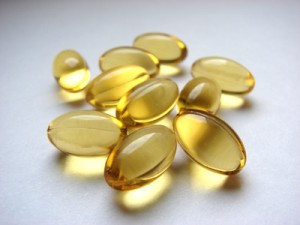 Another study showing Vitamins may be harmful. Another biased attempt to make vitamins drugs.
Another study showing Vitamins may be harmful. Another biased attempt to make vitamins drugs.
The new study follows two earlier studies that examined whether vitamin E and selenium could prevent or reduce the incidence of non-melanoma skin cancers and lung cancers. Researchers in those studies found that participants had 32% to 60% fewer cases of prostate cancer. In another study, among current smokers and men who had quit, vitamin E intakes of more than 400 IU/day were associated with a statistically significant 71% reduction in the risk of advanced prostate cancer.
Here’s the new headlines
-
Vitamin E and the Risk of Prostate Cancer, October 12, 2011, Klein …jama.ama-assn.org/content/306/14/1549.short
by EA Klein – 2011
4 days ago – Context The initial report of the Selenium and Vitamin E Cancer Prevention Trial (SELECT) found no reduction in risk of prostate cancer with … - Vitamin E Gives Men A Daily Dose of Prostate Cancer Risk – ABC …
abcnews.go.com › Health
5 days ago – New evidence about the effect of vitamin E on prostate cancer risk may make some men think twice before they pop a daily supplement.
- Study Shows Vitamin E Increases Prostate Cancer Risk | Health …
www.voanews.com/…/Study-Shows-Vitamin-E-Increases-Prostate-Ca…
2 days ago – A number of medical studies over the years suggested that vitamin E, taken as a dietary supplement, might help prevent prostate cancer.
- Vitamin E Supplements Raise Risk Of Prostate Cancer
www.medicalnewstoday.com/articles/235881.php
3 days ago – Men who regularly take vitamin E supplements eventually have a higher risk of developing prostate cancer, compared to other men
False Conclusions
The problem with this research is that the analysis is biased and so the researchers are missing the point revealed by the data and drawing false conclusions.
Here’s what they should conclude: Synthetic Vitamin E (dl-alpha tocopherol) by itself creates an imbalance that increases the risk of prostate cancer by 17% over placebo. The study clearly shows that adding one single synergistic mineral (selenium) to Vitamin E reduces that risk by 12%.
What the researchers fail to recognize, because they received little or no training in nutrition in medical school is that Vitamin E is really 8 different molecules with synergistic activities . All 8 together work better than any one isolated by itself. This research shows that treating Vitamin E like a drug and synthesizing and giving just one component causes side-effects.
Vitamin E Supplements
Supplements of Vitamin E typically provide only alpha-tocopherol, although “mixed” products containing other tocopherols and even tocotrienols are available. Naturally occurring alpha-tocopherol exists in one stereoisomeric form. A given amount of synthetic alpha-tocopherol (listed on labels as “DL” or “dl”) is therefore only half as active as the same amount (by weight in mg) of the natural form (labeled as “D” or “d”). People need approximately 50% more IU of synthetic alpha tocopherol from dietary supplements and fortified foods to obtain the same amount of the nutrient as from the natural form.
The SELECT Vitamin E study also failed to include a host of other synergistic components that should be included with Vitamin E, such as alpha-lipoic acid. Vitamin E and alpha-lipoic acid are potent nutritional antioxidants, and when used together, their antioxidant capabilities are improved as alpha-lipoic acid recycles vitamin E. (Clin Appl Thromb Hemost. 2006 Apr;12(2):169-73)
Cancer Preventive Effects of Vitamin E
Both types have shown antiproliferative, proapoptotic and cyclooxygenase-2- inhibiting effects in in vitro studies. Several animal studies have demonstrated that vitamin E has cancer-preventing effects. However, clinical trials have not shown similar results for the cancer prevention effect of tocopherol.
Vitamin E, especially tocotrienols, seems to be a potent agent for cancer prevention, however no large-scale clinical trial on the cancer prevention effect of tocotrienols has been conducted yet. (Curr Pharm Biotechnol. 2011 Apr 5. [Epub ahead of print])
Bias and Vested Interests Prevents Credible Research
The San Antonio-based Southwest Oncology Group, which is a consortium of more than 400 medical groups, is coordinating the National Cancer Institute-funded SELECT study.
Dr. Joseph W. Basler, associate professor of surgery at the University of Texas Health Science Center, and the principal investigator for some 500 San Antonio men who took part in the study, said “You’d like to be able to prevent cancer from developing, as opposed to treating it after it occurs. If we could do that, we would put ourselves out of business, but it would be better for the patient.”
Conflict of Interest
You will not see this in media coverage of the biased Vitamin E study, or at the JAMA website, of course, but if you read the entire paper, and get to the very last page (1556), you’ll find the “Conflict of Interest” section. Here you will discover that a number of the study authors have received money from pharmaceutical companies, including Merck, Pfizer, Sanofi-Aventis, AstraZeneca, Abbott, GlaxoSmithKline, Janssen, Amgen, Firmagon, and Novartis. In terms of cash, these are some of the largest corporations on the planet.
Andrew W. Saul: says, “Well how about that,” said Andrew Saul, Editor, Orthomolecular Medicine News Service, another “vitamins are dangerous” article, in one of the most popular medical journals, with lots of media hype . . . and the pharmaceutical industry’s fingerprints all over it.
Click here to read Andrew Saul’s article entitled, “Vitamin E Attacked Again Of Course. Because It Works.”

